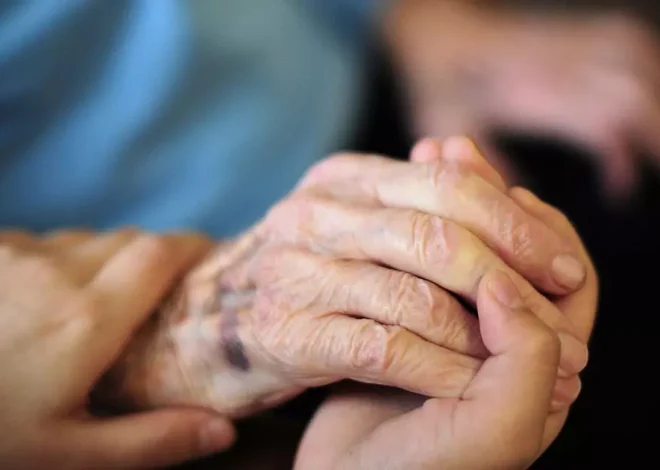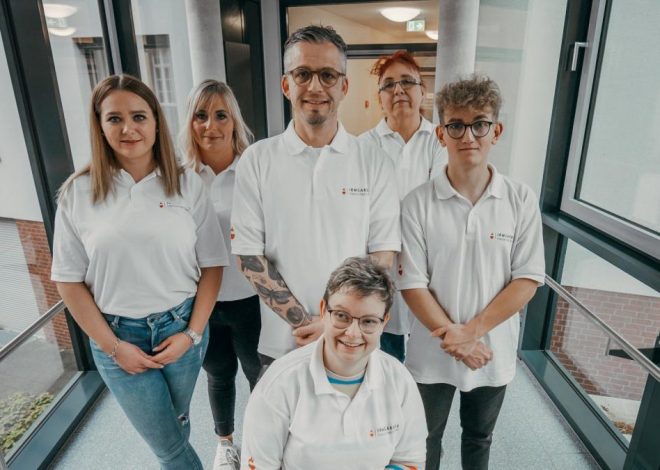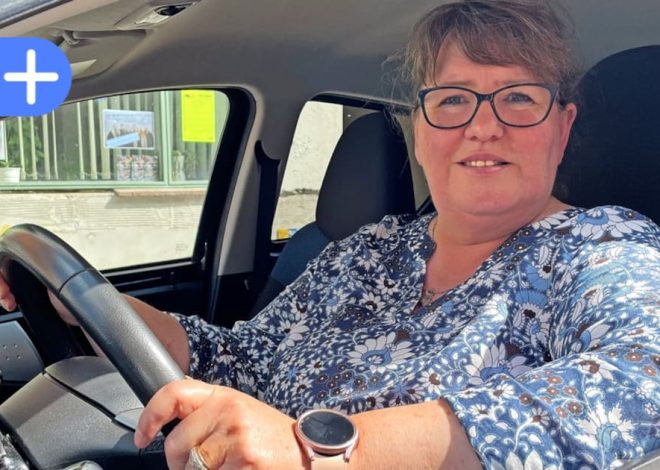
“There is far too little discussion about gender diversity and sexuality in nursing”
Hannah (30) and Judith Burgmeier (38) have been building an outpatient nursing service for everyone in Bremen since 2024. What’s special about it: diverse. GmbH is Germany’s first nursing service with a focus on sexuality in old age and gender diversity. They offer classic nursing care, but also individual couple, relationship and sexual counseling. They also run workshops on the topics of sexuality and identity in relation to nursing care for employees in the healthcare sector.
Read more after the Advertisement
Read more after the Advertisement
You are setting up an outpatient care service in Bremen with a focus on sexuality in old age and gender diversity. There is nothing like this in this country yet. What drives you?
Hannah Burgmeier: There is far too little discussion about gender diversity and sexuality in nursing. We have hardly encountered such topics in nursing training or in our everyday working lives. Most institutions simply say: We don’t have that at all. But that’s not true. The topics exist, but they are taboo. Especially in older generations who are in need of care. Especially in our highly hierarchical health system. We want to do something about that.
Judith (left) and Hannah Burgmeier have been working in nursing for a long time and have also completed master’s courses in nursing and health management and sexology and sex education. They both have a queer life story and live together in a romantic relationship.
Source: Private
Read more after the Advertisement
Read more after the Advertisement
Judith Burgmeier: So far, if we discuss sexuality in nursing at all, it’s all about violence and assault. But there’s hardly any talk about the fact that sexuality is a basic human need – and doesn’t suddenly disappear in old age. Sexuality is, first and foremost, a great health-promoting resource. In addition, around 10 percent of the population in Germany identify as queer. So it’s safe to assume that a large proportion of people in old age are also queer.
However, those who work in care facilities are not given the opportunity to face these realities. You really have to put yourself in their shoes. If someone lives in a care facility, they will probably be touched by twenty different members of staff every month during basic physical care. It is astonishing that sexuality and gender diversity are hardly discussed.
What consequences does this have on the everyday lives of those in need of care?
Judith Burgmeier: An example when it comes to sexuality: A person living in a care facility has dementia and is taking medication that can increase libido. During personal care, the person gets an erect penis and starts to masturbate. In such a situation, it is common practice to laugh it off or stop it. Sometimes the person is devalued and discriminated against. This means that this person is denied a basic human need.
Hannah Burgmeier: Who knows how long it has been since this person was last intimately touched? The fact that personal hygiene triggers a reaction is something we cannot influence. It is not bad either, in fact it is completely normal. We should always keep in mind that people can no longer live out their sexuality in the way they did before they became in need of care.
Imagine a person who has come out and lived a queer life. Then they end up in a care facility and can no longer be sure that they will be treated well. The person is completely dependent on others – and at the end of their life they prefer to hide their own identity again for fear of being discriminated against. This can be traumatic. It brings back feelings from the past.
Read more after the Advertisement
Read more after the Advertisement
What do you mean?
Hannah Burgmeier: We must not forget that those queer people who are now between 70 and 90 years old had to hide their identity as young people because they would otherwise have been prosecuted. After Paragraph 175 was abolished, they experienced a feeling of freedom in society. It was no longer forbidden for a man and a man or a woman and a woman to walk down the street holding hands. Now, as they get older and need care, many end up in the strongly heteronormative structures of the health care system. They are making a backward turn. They no longer have to fear criminal prosecution – but they do have to fear discrimination.
Judith Burgmeier: This really happens all the time. People who don’t fit into any of the categories are systematically excluded in our health system. I’m reminded of an example of an ageing transgender person we cared for who was admitted to hospital with a femoral neck fracture. Normally, you would expect the fracture to be operated on – and then you’d go home. In this case, however, the entire treatment was sexualized. The fracture was no longer the dominant topic, but the penis of the person being treated, which, in the opinion of the hospital staff, did not belong there.
What is needed to ensure that such discrimination no longer occurs?
Judith Burgmeier: There is no one we can point the finger at. No one is immune to everyday discrimination. It happens to all of us. It is important that we talk about it more and reflect on it without blame. I can understand the impulse to put people into categories because it makes our lives less complicated. But particularly when it comes to nursing staff and also those in medicine and therapy, there needs to be much more room for reflection. We are dealing with ageing and sick people who are dependent on our protection and care – often for a long period of time. The attitude that our oh-so-enlightened society knows everything and is totally enlightened is not particularly helpful.
Read more after the Advertisement
Read more after the Advertisement
Hannah Burgmeier: It often takes a personal confrontation with one’s own attitude in order to break down barriers. This is shown again and again in workshops that we do with care facilities and healthcare institutions. For example, we ask ourselves what sexuality can mean. It is about penetrative sex, yes. But it is also about tenderness. About intimacy with others, with myself. It is also about my own sexual identity. In other words, about how I understand myself and how I want to be read by others. Also about how I was influenced in relation to sexuality. If, for example, no one around me was ever naked in my childhood, it is possible that I will have difficulties with nudity as an adult. When I am confronted with this influence for the first time in care, it is simply difficult.
What can happen then, for example?
Hannah Burgmeier: If I then feel shame, I may start Covering genitals. Washing the intimate area more quickly than necessary. If I do this without explaining, it will be difficult to deal with people in need of care who are dependent on my help. If I am ashamed, the person I am caring for will sense it and may also be ashamed. The result is often that people being cared for become more and more withdrawn. They want to cause as little stress as possible because they feel like they are already a burden. That is why it is so important to have a professional attitude in order to be able to deal with people appropriately. As a person in need of care, I cannot choose who I deal with on a daily basis.
What else can help besides reflecting on your own inner attitude?
Judith Burgmeier: A structured approach and space for enabling is needed. This starts with the admission interview, where nursing staff and managers can signal their openness to such topics. They can actively offer to talk about sexuality. Point out that this doesn’t have to happen if it isn’t wanted. Very few people simply say of their own accord: I still want to see beautiful people, watch porn, look at a magazine or use a sex toy. Can you make this possible for me?
Read more after the Advertisement
Read more after the Advertisement
Hannah Burgmeier: But it’s also about very practical tips. One of the most common: think about door signs. If you live in a facility for a long time, you can simply hang them up, if that’s still possible, to have quiet time – for sex, an intimate conversation, time for yourself. People in the health care system rarely have this space for themselves. A group of doctors come in unannounced, closely followed by nursing staff. At the moment the rule is: I make my body available to everyone at any time, but suppress my own inner needs. We have to get away from this attitude.
The Vielfältig nursing service can be reached via its homepage, as well as via Instagram @vielfaeltig_bremen and LinkedIn @vielfältig.

Ethel Purdy – Medical Blogger & Pharmacist
Bridging the world of wellness and science, Ethel Purdy is a professional voice in healthcare with a passion for sharing knowledge. At 36, she stands at the confluence of medical expertise and the written word, holding a pharmacy degree acquired under the rigorous education systems of Germany and Estonia.
Her pursuit of medicine was fueled by a desire to understand the intricacies of human health and to contribute to the community’s understanding of it. Transitioning seamlessly into the realm of blogging, Ethel has found a platform to demystify complex medical concepts for the everyday reader.
Ethel’s commitment to the world of medicine extends beyond her professional life into a personal commitment to health and wellness. Her hobbies reflect this dedication, often involving research on the latest medical advances, participating in wellness communities, and exploring the vast and varied dimensions of health.
Join Ethel as she distills her pharmaceutical knowledge into accessible wisdom, fostering an environment where science meets lifestyle and everyone is invited to learn. Whether you’re looking for insights into the latest health trends or trustworthy medical advice, Ethel’s blog is your gateway to the nexus of healthcare and daily living.



